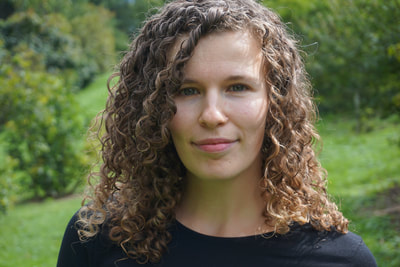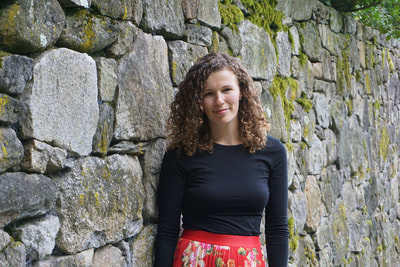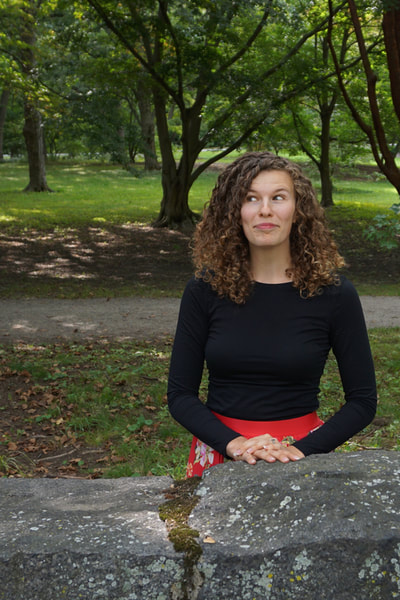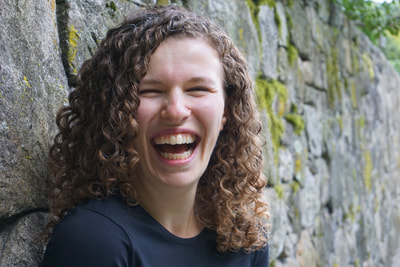“Which would you rather be if you had the choice--divinely beautiful or dazzlingly clever or angelically good?”
When I first read the book, I instantly knew the answer that I felt I should choose: to be angelically good. I even knew that I would be wise to choose cleverness as my wished for gift. But I also knew in my heart which I would pick if I had the choice. No question.
I would pick divinely beautiful.
My feelings about my appearance are like most people: I have a longstanding, complex history of mulling over what I look like. What I wish I could look like. Trying to find a middle path of making peace with me, as I am. As a kid, I was one of the only kids in my school with big curly hair and at that time, there weren't many characters in my favorite movies or t.v. shows that had curly hair. All the popular girls in my school had sleek, shiny, straight hair. I wanted that hair so badly. I saw how boys looked at these girls, with hair that shone in the sunshine on the playground, hair that they could run their fingers through. If I tried to do that with my curls, my fingers got stuck in a tangled mess.
I had experiences on both ends of the spectrum when it came to comments on my appearance: my wonderful mother always told me I was the most beautiful girl in school. When I would cry about my hair, she would tell me that the fact that my hair was curly and different from the other girls, was what made it beautiful and special. At the same time, I had boys in my class that would call me ugly to my face in front of kids on the bus or in the halls. It really messed with my head and my heart. I started straightening my hair. I didn't wear clothes that I felt were too colorful or bold. I didn't want to give people another reason to call me out. I told myself for a long time that since I wasn't pretty, I could focus on being other things: smart, funny, creative. I'm grateful now for feeling these things much of the time, and realize that had it not been for my insecurities about my appearance, I might not be have felt the need to develop these other parts of myself as a kid. If I had been born blindingly beautiful, I may have not felt the need to push myself in other ways, which would have surely led to another kind of insecurity and trouble. I am not proud to say that I used to put that much stock in my own appearance, but it's true.
So how did this younger me, who would do anything to blend into a crowd, end up as someone who stands onstage as her life's work? I sometimes wonder why I have such a desire to perform in front of audiences, where you are visible to anyone who wants to look. Why I want to be an actor, a profession that requires you to have headshot photos. Where every line and blemish is on display. I am getting a weird knot in my stomach just writing about it. How can I want all of these things and at the same time, feel so uncomfortable with a photograph of myself?
Back to headshots.
If you've ever had any photo of yourself taken, whether by request or without your consent, you must know all the emotions that come along with seeing the image of your own self. Think actors are any different? I can assure you, we're not. At least I'm not. When it comes to my appearance, in many ways, I have the same insecurities deep down as I did when I was a little kid.
After my new headshots this weekend, I'm having the oh-so-familiar dialogue in my head about how I think I look.
I have new wrinkles. I look so old!
I wish my nose was smaller.
I wish my eyes were bigger.
I wish I had straight teeth.
Why can't my hair behave?
I didn't wear enough make-up.
I wore too much make-up.
I'm not pretty enough.
Does this mean as an actor I'm not enough?
Does this mean as a human, I'm not enough?
I write these out here not to evoke pity or sympathy or compliments, or even because I think these things most of the time. I don't. Most of the time I have a deep peace with how I look and recognize how long it took for me to get to a place of appreciation and acceptance. I am very grateful for this.
No, I share these things to be honest and to let anyone reading this know that one of the threads that connects us as human beings to each other is the ability to be critical of ourselves and question whether or not we are enough. It's so hard and painful to make peace with the difference between how you want to look and how you look. How much you want to know and what you know right now. This kind of comparison is natural, yes, and it has the ability to drive someone mad.
I think the challenge I'm trying right now is to not deny the physical imperfections, the features I wish were a bit different, but to name those feelings and make room for them. I'm done with the idea of "letting go" and starting to see some progress with accepting and making room. I'm not there yet, but I'm taking a step in what I hope is a healthy direction. When we deny something, it doesn't really go away. Saying it aloud lets it out and allows us to walk through life with it instead of trying to fight it and shake it off the whole way. It's a new experiment for me.
I do have new smile lines and some crazy curly white hair that is growing in. Why deny that? It'd be a lie to say I would keep these things if I had the choice; of course, if I could, I'd magically transform into a smoother, younger self while at the same time keeping all the wisdom and experience I've gained. Have my cake and eat it, too. Are you laughing yet? I am. How can such a thing be possible?
Ironically, when I see a photograph of an actress with lines and graying hair--Helen Mirren is my favorite example--I do see her wrinkles, the subtle and not so subtle ways her features have shifted over time, her graying hair. I also see a wealth of experience and a treasure trove of source material for the wonderful actress she is. I see beauty that can only be created by a life truly lived. Wrinkles are signs of an existence. Of experience. As an actor, your experiences fuel your work and help to make your performances rich. In this way, wrinkles represent creative wealth. If I want anything more than physical beauty these days, it's creative wealth.
An actor's face tells stories. We use what we have to make people really feel something, something that transform someone's life in a way that they themselves don't even know yet. What could be a better use of your face than that?
Yes, I look a bit different than I did when I got my last set of headshots almost seven years ago. My face has told so many stories since then and experiences so many joys and heartaches and shifts. I want to be grateful for the physical evidence of these things.
My face wears all the stories I've gotten to tell onstage.
It wears the birth of my nephew.
My wedding.
The death of my Grandma, three uncles, and my niece.
The founding of a theatre company.
Meeting my creative soulmates at Emerson College.
Moving to a big city and finding out I can do it.
Working my way through different health issues, both physical and mental.
My actor's face wears all the stories I've ever told, both onstage and off and there is no denying that performing is something that makes me feel beautiful. Which of these stories would I trade for a smoother complexion? Not a single one. These days, I still feel slightly awkward about the shape of my nose, but I have a deeper interest in asking myself why someone can't be both beautiful and imperfect. Why they can't be clever and good and funny and brilliant, all at the same time. I realize the truth in the old idea that it's what we are on the inside that makes us beautiful. It's the way that we make people feel that allows us to overcome the physical imperfections we see so sharply when we look in the mirror and arrive a place where we can transcend our physical forms and become truly radiant in a way that can never fade.
In her book Radical Acceptance, the wise and wonderful Tara Brach writes "Nothing is wrong--whatever is happening is just "real life." I think we can use this to gently remind ourselves that nothing is wrong with our nose, our face, our hair. It's all just the real you.




